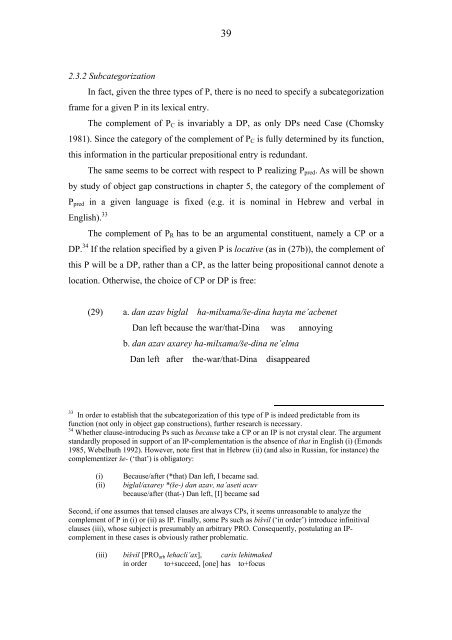The Category P Features, Projections, Interpretation
The Category P Features, Projections, Interpretation
The Category P Features, Projections, Interpretation
You also want an ePaper? Increase the reach of your titles
YUMPU automatically turns print PDFs into web optimized ePapers that Google loves.
39<br />
2.3.2 Subcategorization<br />
In fact, given the three types of P, there is no need to specify a subcategorization<br />
frame for a given P in its lexical entry.<br />
<strong>The</strong> complement of P C is invariably a DP, as only DPs need Case (Chomsky<br />
1981). Since the category of the complement of P C is fully determined by its function,<br />
this information in the particular prepositional entry is redundant.<br />
<strong>The</strong> same seems to be correct with respect to P realizing P pred . As will be shown<br />
by study of object gap constructions in chapter 5, the category of the complement of<br />
P pred in a given language is fixed (e.g. it is nominal in Hebrew and verbal in<br />
English). 33<br />
<strong>The</strong> complement of P R has to be an argumental constituent, namely a CP or a<br />
DP. 34 If the relation specified by a given P is locative (as in (27b)), the complement of<br />
this P will be a DP, rather than a CP, as the latter being propositional cannot denote a<br />
location. Otherwise, the choice of CP or DP is free:<br />
(29) a. dan azav biglal ha-milxama/še-dina hayta me’acbenet<br />
Dan left because the war/that-Dina was annoying<br />
b. dan azav axarey ha-milxama/še-dina ne’elma<br />
Dan left after the-war/that-Dina disappeared<br />
33 In order to establish that the subcategorization of this type of P is indeed predictable from its<br />
function (not only in object gap constructions), further research is necessary.<br />
34 Whether clause-introducing Ps such as because take a CP or an IP is not crystal clear. <strong>The</strong> argument<br />
standardly proposed in support of an IP-complementation is the absence of that in English (i) (Emonds<br />
1985, Webelhuth 1992). However, note first that in Hebrew (ii) (and also in Russian, for instance) the<br />
complementizer še- (‘that’) is obligatory:<br />
(i)<br />
(ii)<br />
Because/after (*that) Dan left, I became sad.<br />
biglal/axarey *(še-) dan azav, na’aseti acuv<br />
because/after (that-) Dan left, [I] became sad<br />
Second, if one assumes that tensed clauses are always CPs, it seems unreasonable to analyze the<br />
complement of P in (i) or (ii) as IP. Finally, some Ps such as bišvil (‘in order’) introduce infinitival<br />
clauses (iii), whose subject is presumably an arbitrary PRO. Consequently, postulating an IPcomplement<br />
in these cases is obviously rather problematic.<br />
(iii) bišvil [PRO arb lehacli’ax], carix lehitmaked<br />
in order to+succeed, [one] has to+focus
















